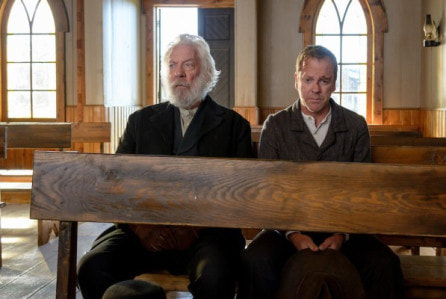Cassar, operating from Brad Mirman’s script, has the good sense to borrow from the best of the genre. Forsaken thematically rhymes with Unforgiven, and has similar goals of showing the weight and inescapability of violence. John Henry is depicted as a near-saint in his resistance to the taunts of McCurdy’s goons, both out of a desire to stick to his chosen path and because he knows their goal is to provoke a reaction out of him. It’s inevitable that the film will push him too far and he’ll surrender to rage and bloodshed, but Cassar and Kiefer get mileage out of forestalling that event.
The script also makes some contemporary nods to the difficulty of adapting from post-military life, as John Henry has been hollowed out by what he did and saw in places like Shiloh. While he was surrounded by the ends of lives, others continued apace back home, leaving him behind and shutting off what might have been possibilities before his service. This thread is most embodied by a respectable Demi Moore performance as John Henry’s old flame Mary Alice Watson, now married to another man. Still amiable towards him, Mary Alice has a difficult time recognizing that the man she once knew is almost wholly gone. The most unique character, a goon working for McCurdy played by Michael Wincott, has learned a similar lesson to John Henry from his time in the war, that violence is a dreadful tool that should be used when there’s little other alternative. Someone like that on the side of the bad guys is a plus for Mirman, muddying the moral waters in a genre that can always use more shading amongst the black and white hats.
However, Mirman’s script giveth and taketh away. Forsaken hamfistedly starts with a screaming woman cradling the body of her dead son, a jolt that comes off as exploitative. The viewer eventually learns the circumstances of the scene, but the reveal is not worth the agony, especially when there’s other ways to communicate the horror of it. Away from individual scenes, the roteness of Forsaken is what’s most irksome. It feels like this film has been made dozens of times in America, Italy, and Japan. Nothing surprises, from the plot to the dialogue.
The predictability of Forsaken is remedied by the film’s big draw, which is to see a father and son passionately acting against each other. If the dialogue is doing the Sutherlands few favors, they are both asserting that they don’t need favors in the first place. Scenes of the two of them ripping scabs off their relationships are raw and powerful, with raised voices and stunned reactions afflicting both. The script tasks them with a project to clear a field, and while it’s never in doubt that Samuel will at one point join John Henry in doing so, that doesn’t mean their wordless reactions don’t work when he does, as does Samuel’s small suppression of a smile when John Henry shows up in his church. Whether the film was cathartic for the Sutherlands or not, it feels like it is, like the viewer can imagine them hugging after a tense scene and then trying to make the other better. This bit of extratextualism serves to make an average film better than it deserves to be. Cassar’s direction is passable and the script is mostly cribbing, but the acting carries Forsaken into respectable, even admirable, territory. B-

 RSS Feed
RSS Feed